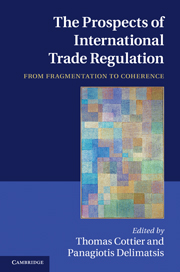Book contents
- Frontmatter
- Contents
- List of figures
- List of tables
- Contributors
- Preface and acknowledgements
- Table of cases
- List of abbreviations
- Introduction: fragmentation and coherence in international trade regulation: analysis and conceptual foundations
- PART I Constitutional issues in international trade regulation
- PART II Reforming specific areas of trade regulation
- 4 Reframing sustainable agriculture
- 5 Energy in WTO law and policy
- 6 Developing trade rules for services: a case of fragmented coherence?
- 7 Challenges of biotechnology in international trade regulation
- PART III ‘Trade and…’ linkages
- Index
- References
5 - Energy in WTO law and policy
from PART II - Reforming specific areas of trade regulation
Published online by Cambridge University Press: 26 April 2011
- Frontmatter
- Contents
- List of figures
- List of tables
- Contributors
- Preface and acknowledgements
- Table of cases
- List of abbreviations
- Introduction: fragmentation and coherence in international trade regulation: analysis and conceptual foundations
- PART I Constitutional issues in international trade regulation
- PART II Reforming specific areas of trade regulation
- 4 Reframing sustainable agriculture
- 5 Energy in WTO law and policy
- 6 Developing trade rules for services: a case of fragmented coherence?
- 7 Challenges of biotechnology in international trade regulation
- PART III ‘Trade and…’ linkages
- Index
- References
Summary
KEY MESSAGES
∙ The regulation of energy in international law is highly fragmented and largely incoherent. We submit that pertinent issues should be addressed by a future Framework Agreement on Energy within WTO law.
∙ Successful regulation of energy requires a coherent combination of rules both on goods and services. Energy services require new classifications suitable to deal coherently with energy as an integrated sector.
∙ Rules on subsidies relating to energy call for new approaches within the Framework Agreement on Energy. A distinction should be made between renewable and non-renewable energy. Moreover, disciplines need to be developed in the context of emission trading.
∙ The Framework Agreement should address the problem of restricting energy production and export restrictions.
∙ Disciplines on government procurement are able to take into account policies on green procurement, but a number of changes to the GPA Agreement will be required to make green procurement more effective and attractive.
∙ In view of the close interactions between the energy sector and climate change, formulating effective rules to address energy under the WTO system will catalyse coherence and complementarity between the climate and trade regimes.
Introduction
Sixty years ago, when the rules of the GATT were negotiated, world energy demand was a fraction of what it is today and so were energy prices. While energy has always been a crucial factor in geopolitics, at that time liberalising trade in energy was not a political priority. The industry was largely dominated by state-run monopolies and thus governed by strict territorial allocation.
- Type
- Chapter
- Information
- The Prospects of International Trade RegulationFrom Fragmentation to Coherence, pp. 211 - 244Publisher: Cambridge University PressPrint publication year: 2011
References
- 20
- Cited by

